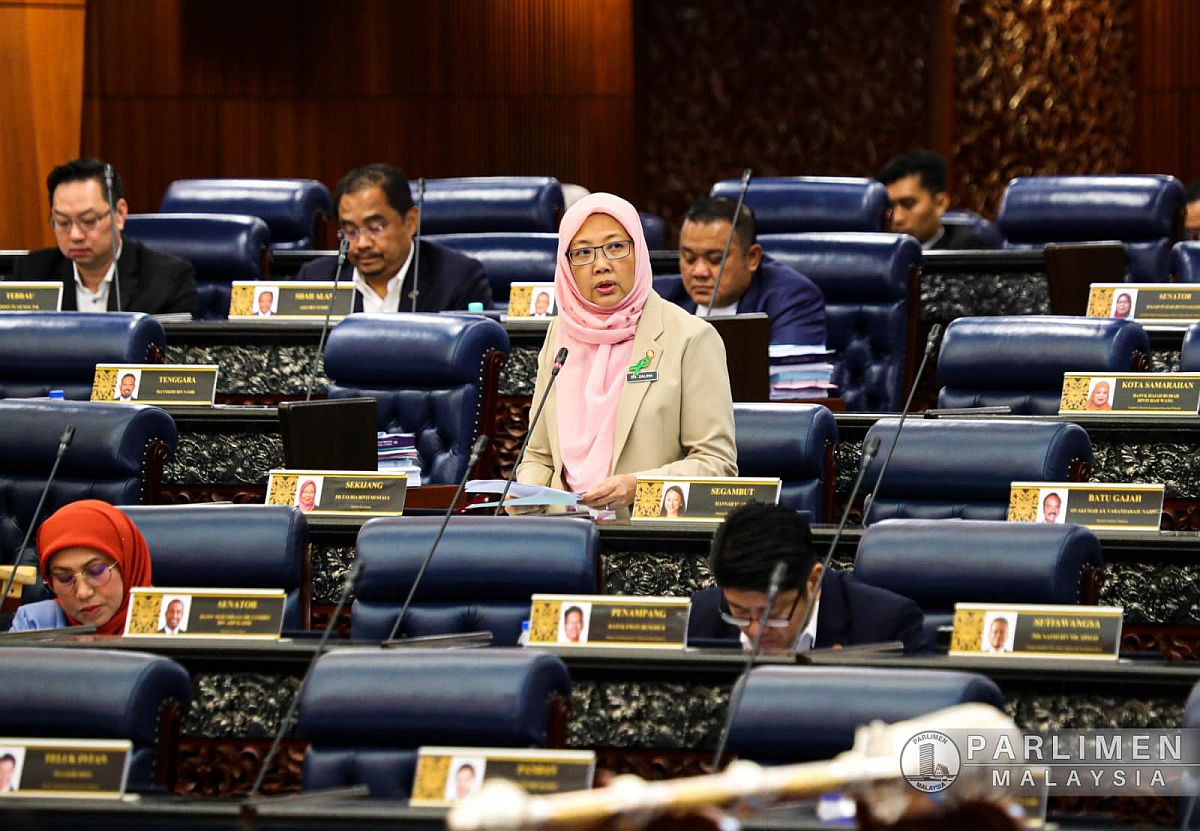KUALA LUMPUR, Nov 3 – Nearly a year in office, Health Minister Dr Zaliha Mustafa, under Prime Minister Anwar Ibrahim’s coalition government, has decided not to make any reforms in chronic issues plaguing government doctors that have led to a spike in resignations.
After Dr Zaliha’s town hall session with doctors in the public sector that was organised by the Malaysian Medical Association (MMA) last February 22, the Ministry of Health (MOH) provided a written response to MMA last month on several issues raised at the meeting.
The MOH’s response maintained the status quo for key demands like a raise in doctors’ on-call allowance, clear selection criteria for permanent and JUSA positions, and promotions for contract medical officers.
MMA Schomos honorary secretary Sean Thum shared the MOH’s written response on X, which stated that the MOH had submitted applications and appeals to the Public Service Department (JPA) from 2020 to 2022 to increase on-call rates, but these requests were rejected.
MOH further defended the existing on-call allowances for medical officers on weekends and public holidays, saying that doctors receive various other allowances, including:
- Critical Services Incentive Payment (RM750 a month).
- Specialist Incentive Payment (RM2,200 to RM3,100 a month, depending on grade).
- Allowance for Medical Officers on Duty After Office Hours at Health Clinics and Hospital Emergency Departments (Locum Allowance) (RM80 per hour).
- Elective Surgery Allowance (RM200 per hour for specialists and RM80 per hour for medical officers).
- Hospital Administration Allowance (RM1,520 to RM2,480 per month, depending on grade).
The MOH stated that the government’s current priority is to address allowance rates for service schemes that receive less than RM100 per month.
At Dr Zaliha’s February town hall, government doctors complained that they are paid only RM9 per hour for on-calls, which is less than what some retail staff (RM10 per hour) and cleaners (RM20 per hour) earn.
These on-call rates have remained unchanged for the past decade.
Additionally, the MOH maintained its stance on the selection criteria for the transition from contract to permanent doctors, which has come under fire for lacking transparency.
However, the ministry stated it is willing to consider incorporating the point system proposed by MMA during the town hall session into its current evaluation process.
“The MOH has reviewed MMA’s proposal and believes that the proposed criteria is objective with marks awarded for the designated components. The point system may be applied in the assessment of the qualification of professionalism aspect in the interview,” MOH said.
The ministry, however, highlighted that the terms for contract doctors seeking permanent positions are clearly outlined in the employment advertisement issued by the Public Services Commission (SPA).
During the interview, which is conducted by a panel including at least one medical officer, contract doctors applying for permanent posts are evaluated based on five key aspects: skills, teamwork ethics, leadership qualities, personal identity and integrity, and qualifications of professionalism relevant to the position.
MOH said that these criteria and evaluations do not solely measure a candidate’s knowledge and skills but also assess their “suitability”, which includes their ability to follow instructions and their dedication to serving the public interest.
In August 2022, MMA called on the MOH to make the selection criteria for permanent positions in the public sector more transparent to address the dissatisfaction among contract doctors.
Former MMA president Dr Koh Kar Chai noted that offers of permanent positions were “ultimately based on the reports transpiring from the interview process”, regardless of any additional educational or professional qualifications that a candidate may possess.
Furthermore, the MOH said that the promotion of medical officers to the JUSA grade is contingent on the availability of positions.
Officers aspiring to attain JUSA grade must fulfil the following conditions: certification by the Head of Service, a clean disciplinary record, successful screening by the Malaysian Anti-Corruption Commission (MACC), and maintaining an annual performance of 85 percent or higher for three consecutive years.
Officers must also satisfy five additional criteria: performance, expertise and work experience, competency and career development, contributions that go beyond their regular duties, and recognition.
These criteria are clearly detailed in items 42 to 53 of the Management Guide to Acting and Promotion in The Public Services in the Human Resources Service circular (My PPSM).
Immediate Appointment To UD43 After Housemanship Impossible
The MOH also stated in the written response to MMA that it is not feasible to immediately promote housemen who have completed their housemanship early to the UD43 grade.
Housemen who are under a three-year UD41 contract for their housemanship cannot be fast-tracked to the UD43 grade, as it would disrupt the existing agreement and necessitate the issuance of a new contract, MOH said.
In other words, the MOH wants to maintain the need to standardise three years for the first contract for housemanship, regardless whether or not doctors complete housemanship in less than three years, which indirectly disincentives good performance.
“According to the prevailing contract appointment rules and policies, promotions or grade changes within the same contract period are not allowed. A contract officer’s grade can be modified with the awarding of a new contract at a higher grade after the end of a specific contract.
“If the UD43 grade is granted immediately after the completion of housemanship training (before three years), the initial UD41 three-year contract would need to be shortened, and the housemen would need to be given a second contract at the UD43 grade.
“This is a complex matter due to variations in timelines for graduate training and full enrollment for different officers,” MOH said.
Meanwhile, MMA’s proposal to retroactively adjust or backdate the appointment of permanent contracts to include the years of service rendered as contract doctors, was also rejected by the MOH.
The ministry said it is unable to do so as most medical officers are initially appointed as contract medical doctors during their two years of mandatory government service or their two years of extended service.
Consequently, a new contract replaces the old one, and officers are paid after the old contract ends. The time served under the old contract, for which the officer received gratuity, is not factored into the calculation of retirement benefits for their permanent position.
“In the current process of permanent appointments, medical officers are appointed via ‘lateral entry’ to the UD43 grade. Therefore, the seniority factor is a significant factor to take into account in these appointments, and officers will be promoted to UD48 and the next, following the standard medical officer time-based route.”
The MOH argued that if the previous contract period of service were to be considered, medical officers who have already reached the UD43 grade would first need to be appointed to the permanent UD41 grade while the backdating for promotion is carried out.
This process would require officers to remain in the UD41 grade after their permanent appointment, pending their promotion to the UD44 grade.
MOH To Run Supply And Demand Study
The MOH also announced plans to conduct a supply and demand study for doctors in Malaysia, in response to MMA’s request for real-time data on the number of doctors needed by each MOH facility. This study will consider various factors, including the total population, patient influx, and the complexity of medical cases.
“The MOH will conduct a gap study to assess the supply and demand for healthcare facilities, equipment, and human resources in Malaysia. The study’s results will include a detailed map of the distribution and future needs of health care staff, including doctors, across the country.”
Currently, data regarding the number of doctors in both the public and private sectors in each state is available through periodic publications of Health Indicators. These publications also provide information on the doctor-to-population ratio.
The Human Resources for Health Country Profile 2015 – 2018 offers insights into the geographical distribution of doctors and also includes historical data on human resources. Additional information on the number of doctors can be accessed through the MOH’s portal.
The MOH and State Health Departments (JKN) collect monthly data on the number of personnel in facilities for reporting, monitoring, filling of positions and changing of officers. According to MOH, this information is classified and stored for official use only by the MOH and JKN.
On calls to establish a health reform commission, the MOH referred to the Health White Paper, which outlines reforms across a 15-year-period, including the establishment of a health care reform commission that will function as a check and balance entity.
Once established, MOH said the commission will be tasked with the monitoring, advising, and reporting on the status of the implementation of health care reforms to Parliament and the people.








